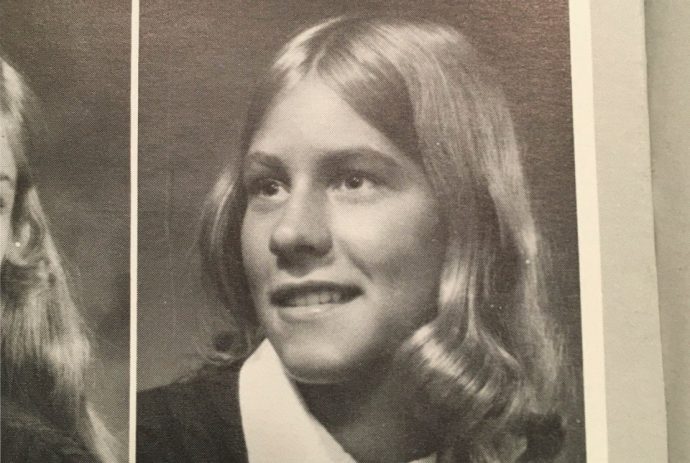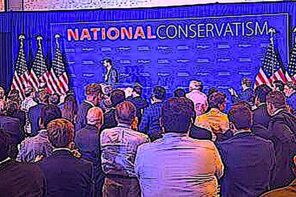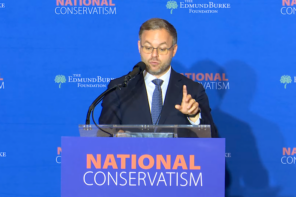Perhaps Betsy DeVos can be forgiven for imagining that America’s Historically Black Colleges and Universities (HBCUs) were “real pioneers when it comes to school choice.” I mean, she wasn’t there in the middle of the 19th century, so how could she know?
I’m kidding, of course: it’s appalling to see such ignorance in someone who is leading the Education Department.
What’s vastly harder to forgive is the Education Secretary’s draping of the banner of civil rights over what is in fact a longstanding sectarian campaign to subvert public education and drain away public resources for decidedly religious purposes. She got the clueless Mr. Trump to mouth the preferred mantra both in his address to a joint session of Congress and later during his drive-by visit (with DeVos and daughter Ivanka) to a Florida parochial school. That new shibboleth: “School choice is the civil rights issue of our time.”
Much of the reporting on DeVos has centered on her enthusiasm for charter schools and her lavish spending to promote low-performing charters in Michigan and in Detroit in particular.
While billionaire fascination with charters (and here the interventions of the Waltons and the Broads make the DeVos family look like pikers) is well worth exploring and exposing, the steady advance of state-level schemes to fund religious education using taxpayer funds barely breaks the surface of media attention.
State support for religious education takes many forms, the cleverest being the approach pioneered in Arizona ten years ago, whereby individuals get state tax credits for donating to intermediary nonprofits that in turn make tuition grants. Florida has a similar scheme. While relatively few states currently engage in such blatant dodging of the church-state separation principle, dozens offer indirect subsidies in the form of school transportation, textbooks, etc. With DeVos now “leading the charge” (Trump) on treating private education as a civil right, we can reasonably expect religious schools to be among the main beneficiaries in state after state.
In December Politico caused a minor stir when it reported on comments made by Betsy and Dick DeVos 15 years ago in the context of an interview they gave during “The Gathering,” a conclave of powerful Christian activists, to the effect that replacing public schools with religious schools will “advance God’s Kingdom.”
Betsy DeVos made waves of her own with this quote at last year’s annual meeting of the American Federation for Children (an organization that she helped to found):
We are winning in state after state. In the past six years, we’ve doubled the number of private school choice programs to 50, the number of private school choice states to 25, plus Washington, D.C., and doubled the number of students currently benefiting from private school choice to 400,000. All told, together, we’ve helped more than a million kids in private school choice programs, and we’re just getting started.
“Just getting started”: we should not underestimate how seriously this should be taken. Betsy DeVos and Dick DeVos consider it a major part of their Christian calling to liberate American schoolchildren from the soul-destroying grip of public education.
Here is Dick DeVos in the same revealing joint interview from 2001 that Politico republished:
The church—which ought to be in our view far more central to the life of the community—has been displaced by the public school as the center for activity, the center for what goes on in the community. It is certainly our hope that churches would continue, no matter what the environment—whether there’s government funding through tax credits or vouches or some other mechanism, or whatever it may be—that more and more churches will get more and more active and engaged through education. We just can think of no better way to rebuild our families and our communities.
If all of the DeVos talk about “advancing God’s Kingdom” and making the church, not the public school, the center of community life sounds a bit weird to you, dear reader, it does not sound weird at all to me. I grew up hearing exactly that kind of talk.
Betsy DeVos happens to be the now-very-public face of what has long been a quiet but very powerful drive for taxpayer-supported religious schooling that has been carried on by one of America’s least-understood ethnic tribes, the Dutch Calvinists of the Upper Midwest. By my count, nine of the thirteen board members of Christian Schools International, a kind of clearing house for the movement, have Dutch names.
The only national publication to link DeVos to her tribal roots has been Mother Jones, in a fine piece of reporting by Kristina Rizga. Rizga visited the small city of Holland, MI, where young Betsy Prince attended Holland Christian Schools. Her father, Edgar Prince, whose hatred of unions was passed along to Betsy and brother Erik (yes, that Erik Prince of Blackwater notoriety), had struck it rich in auto parts manufacturing. Betsy made a very Dutch dynastic marriage when she wed the son of Richard DeVos, the Amway co-founder said to be worth upwards of $5 billion.
Rizga reports in Mother Jones that Betsy DeVos grew up in the Christian Reformed Church and attended its flagship seat of higher learning, Calvin College in nearby Grand Rapids. Rizga notes that the Christian Reformed body broke away from the much older Reformed Church in America roughly ten years after “seceding” Dutch Calvinists first arrived in numbers to settle in Western Michigan, Northwestern Iowa, and a few other chilly enclaves. These “seceders” were unhappy that the Dutch government at the time (1840s) was doing away with some relics of the old Calvinist theocracy in the Netherlands—e.g., ending discrimination against Catholics and Jews (we can’t have that, can we?). In essence the Christian Reformed Church represented a further secession, only one taking place on American soil.
Unlike the millions of Germans and others who emigrated after the failure of the 1848 revolutions across Europe, all of the slightly earlier Dutch Protestant emigrants came to America–and to what they viewed as an unpolluted “virgin” part of America–as hardcore reactionaries, not dewy-eyed social democrats. That difference explains a lot.
I was raised in one of the enclaves created by this separatist emigrant movement: in Holland Township in Sheboygan County, WI. The Christian Reformed Church (CRC) may have broken away from the much older Reformed Church in America (RCA) in 1857, but for us the schism was still so real and palpable that it was as though it had happened yesterday.
We were First Reformed (RCA) people, and my dad would privately refer to the CRC zealots as “the cutoffs” and the “holier-than-thou” crowd. (And it should be said that in the Village of Oostburg—pop. 965 when I was attending Oostburg HS—there was real competition for the holiness crown, because we also had an Orthodox Presbyterian congregation dating from a still-later Calvinist fission of the 1930s.)
The Christian Reformed/Orthodox Presbyterian axis in our little hamlet was able to launch an elementary school—the Oostburg Christian School—in 1947. A Christian high school serving all of Sheboygan County came along 1969. While my parents deplored the implied repudiation of public education, it was hard for anyone not to admire the grit and determination of people with no more money than the rest of us—farmers and small business owners—who were willing to tax themselves to support these religious schools while also paying taxes in support of the public system. Today, however they expect all taxpayers to support and subsidize their “choice.”
Grit and determination: that’s the Dutch Calvinist way. It’s a small tribe that wants to get big things done. Bob Vander Plaats, that ambitious Republican kingmaker out in Iowa? Yep, he’s one: Vander Plaats is Christian Reformed to his core, just like Secretary DeVos.
Oh, and on the race thing: Let’s just say that Dutch Calvinism has never been especially kind to people of African descent. The once-mighty Dutch Republic grew rich from trade, with trade in black bodies forming a large part of it. The extent of slavery in New Netherland (renamed New York and New Jersey after 1664) shocked many when historians brought it to light beginning in the 1970s. And then there are those doughty Afrikaner cousins of ours, whose rigidly racist apartheid ideology was forged by people calling themselves voortrekkers—pioneers—driven to form a separate and righteous society out in the veld.
Like the Afrikaners, and like the English Puritans who took refuge in Holland before sailing off to found their New Israel in Massachusetts, the Devout Dutch I grew up among had little doubt (none, actually) that God was on their side.
But whereas the Puritans eventually mellowed, as did Holland’s own theocrats, American Dutch Calvinists of the DeVos stripe show little sign of mellowing.
They are tough as nails. And, as they say, they are just getting started.





